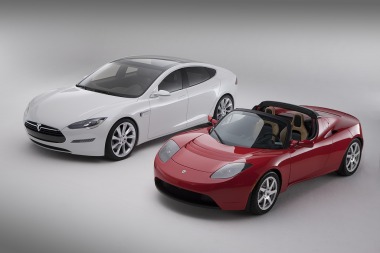America is providing finance for investments of over $2 billion in electric car manufacturing as nations and companies rush to be first with electrified transport. Much of the power for future vehicles is likely to come from nuclear reactors.
The most significant of three recent announcements comes from the US Department of Energy (DoE), which has a loan program of $25 billion to enable the US car industry to begin making fuel efficient models.
 |
Tesla Motors' Model S and Roadster
Furthermore, charging overnight and using batteries that feed back into the grid during peak demand will help to flatten out power demand. With significantly higher demand for low-carbon electricity and a greater scope for baseload, nuclear power is seen as a major beneficiary of a shift to electric transport.
Last year EdF chair Vincent de Rivaz said that carbon reductions from the plug-in cars under test in London would be 40% compared to traditional fossil fuels. However, this could rise to a 70% reduction, with a larger proportion of nuclear power on the grid. |
Nissan is to get a loan of some $1.6 billion to develop and bring to market a its own cost-competitive fully electric vehicle and build a factory for advanced lithium-ion batteries. Fleet and retail customers should eventually be able to buy a total of 150,000 cars per year.
The third loan recipient is Ford, which gets an incredible $5.9 billion loan to upgrade 11 production centres in five states. Most of this relates to fossil-fuelled cars and trucks, but part of the finance will go towards hybrid technology.
Electric car chase
On the other side of the Atlantic, Electricité de France (EdF) and Renault have announced a 'strengthening' of their collaboration with an agreement on recharging systems which allow the vehicle to communicate with the recharge terminal for identification and billing. "This is a concrete step forward that will contribute to the development of the electric vehicle in France," said the largely nuclear utility.
In France, EdF has separate cooperation agreements with Peugeot Citroën and Toyota, while its UK subsidiary EDF Energy is testing a fleet of plug-in Toyota hybrids in the London area.
In addition to that, the UK government yesterday launched what it said was the biggest ever trial of electric vehicles. A total of £25 million ($41 million) will go to support eight schemes across the country which will put a mix of 340 hybrid and fully electric vehicles on the road in 12-18 months. It comes as part of a £400 million ($660 million) national program of 'support and encouragement'.
"We want Britain to be at the forefront of ultra-low carbon automotive technology, blazing a trail for environmentally freindly transportation," said transport secretary Lord Adonis, "Our aim is for ultra-low carbon vehicles to be an everyday feature of life on Britain's roads in less than five years."














